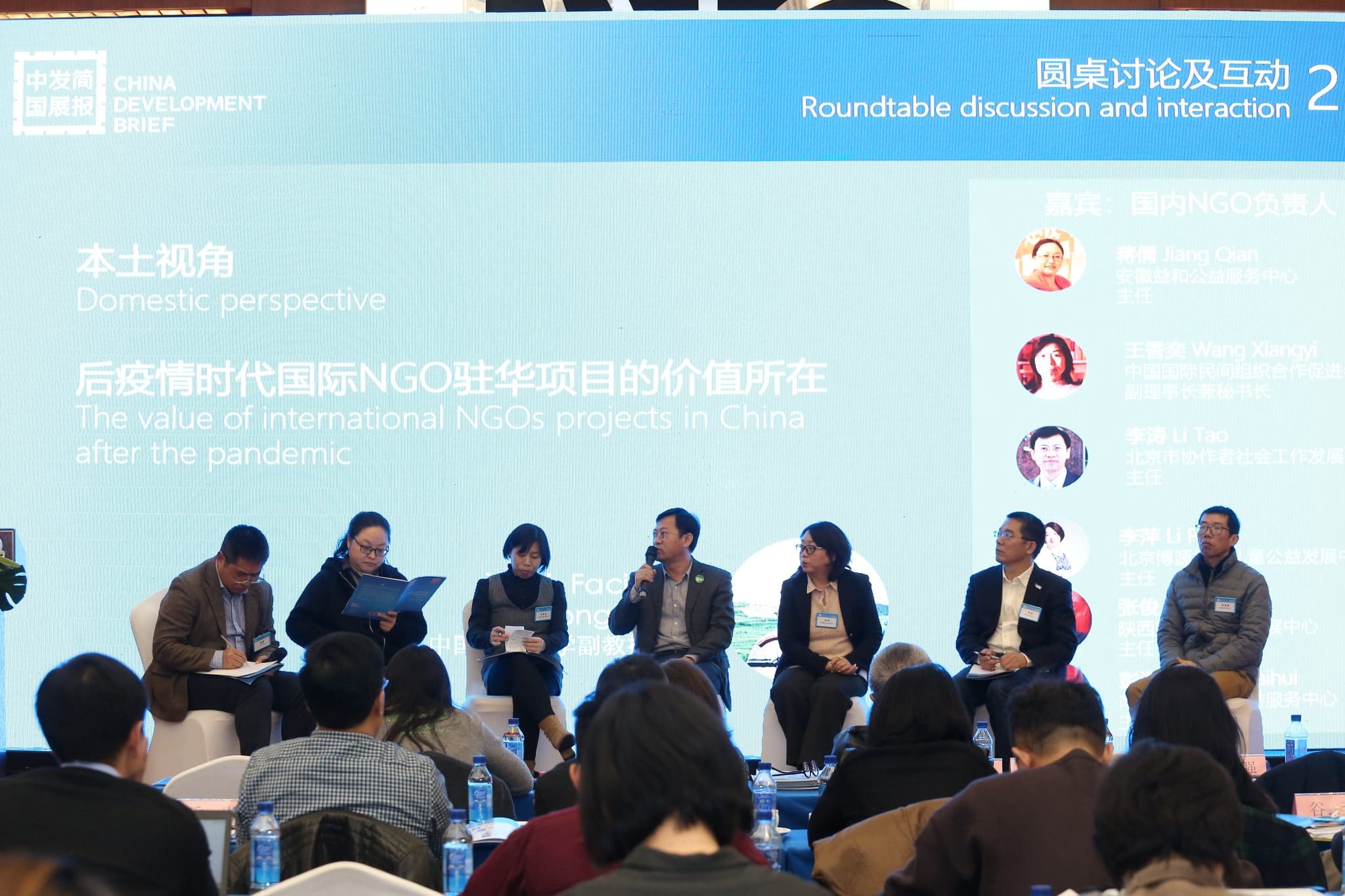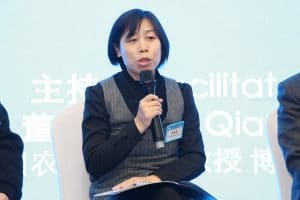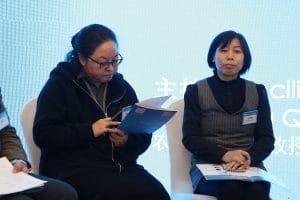Editor’s note:
The China Development Brief (CDB) Forum 2020 was held in Beijing on December 9, 2020 and focused on “Challenges and Responses for Cross-Border Philanthropy under COVID-19.” Leaders from NGOS and experts in relevant fields discussed how the COVID-19 pandemic has affected organisations’ survival and development, grassroots-level struggles faced by communities, and the pursuit of social wellbeing. Below is an excerpt from an abridged compilation of statements shared by guests participating in Roundtable Discussion 2.
This excerpt includes the second part of a conversation held from a domestic perspective on the role of international NGOs in China. Associate Professor of China Agricultural University Dong Qiang facilitated the discussion joined by Jiang Qian, the director of Anhui Yihe Commonweal Service Centre; Wang Xiangyi, vice president and secretary-general of the China Association for NGO Cooperation; Li Tao, director of Beijing Social Work Development for Facilitators; Li Ping, director of Beijing Centre for Leadership Matrix Network; Zhang Jun, director of Shaanxi Gender Development Solution; and Peng Haihui, director of the Nanchang Ahimsa Philanthropy Centre.
Professor Dong Qiang started the following part of the discussion by imploring guests to justify the value of international NGOs’ work in China, and how experts can help the government and society readily recognise and accept the role of international NGOs.

Zhang Jun: The focus can be on gender equality. Firstly, it is a Chinese national policy; and secondly, international NGOs can analyse cases and summary lessons from China, and if possible, they can apply these lessons globally. This can be a focal point of international NGOs.
Li Ping: The 14th Five-Year Plan of China has shown the vision for children in the next five to ten years, including building child-friendly cities, development programmes for children aged 0-3 and judicial protection for children. According to our surveys and assessments, there is a great need for technical support and professional guidance, and international NGOs working with children can focus on these areas.
Li Tao: The participation of and cooperation with international NGOs are needed in various areas. First of all, the diversity of services offered by NGOs in a country, and the scope and multilateral nature of cooperation between NGOs reflect, to some extent, the degree of open governance in that country. It is not a matter of whether we want this phenomenon to happen, or whether we are willing welcome this; it is determined by the variability and complexity of social issues and the trend towards globalisation, which makes extensive cooperation on dimensions of social governance an imperative.
Secondly, each international NGO working in China has its own strategic vision and value, but the key question is how they can fit into China’s development. The economic and social development of China is still uneven, and following an unprecedented wave of massive urbanisation and industrialisation, a large number of social problems have emerged that require urgent intervention from professionals NGO. To determine a specific focal point, it should be clearly noted that a common challenge for NGOs, both domestic and international, is the social division and gaps brought by the pandemic. Therefore, NGOs all over the world need to promote social solidarity, social cooperation, domestic and international exchanges and the creation of pluralistic social bonds.
Wang Xiangyi: With regard to focal point, I think we should not focus on one particular area. As China Association for NGO Cooperation is a platform organisation, we hope international NGOs can work on two fronts:

Firstly, supporting the construction of the sector’s ecosystem, because the ecosystem is very important. There are more than 800,000 NGOs in China, and emergency relief organisations have made substantial contributions during the pandemic, but the coordination was not adequate. Therefore, it is an urgent priority to promote the exchange and cooperation between the horizontal and vertical networks of the sector, and it is hoped that international NGOs can make more efforts in these areas and collaborate with local NGOs.
Secondly, facilitating NGOs’ participation in global governance. For example, I have been participating in a project of China Association for NGO Cooperation since 2009, supporting Chinese NGOs’ participation in the UN Climate Change Conference over the past 14 years but our voice was rarely heard. In the area of global governance, our progress is still slow despite so many years of efforts, so we hope international NGOs can help in this area.
Ultimately, these two aspects complement each other. Only when the healthy development of the nonprofit sector’s ecosystem is achieved can the pace of NGO participation in global governance can be accelerated. We often talk about how the voice of Chinese NGOs in the international arena can match the position of China in international relations. While the nation has been in the centre of the international stage, NGOs are still on the periphery. To this end, it may be necessary to involve more international organisations in building the platform for Chinese NGOs.
Jiang Qian: I think we can start with a few topics:
1) Children’s education. Many NGOs in China are concerned with issues facing by children, but most of them are still engaged in emergency relief only, while few are actively exploring changes and innovations in children’s education, and even fewer have gained remarkable outcomes.

2) Women and gender-related issues. It goes without saying that these topics are part of the national policy and will become increasingly mainstream in the future development of society. However, few NGOs in China focus on these issues.
3) People with disabilities and the migrant population. The population of people with disabilities and immigrants in China is huge, but they have consistently been marginalised and neglected. To address these issues, the participation of the communities in solving these problems is indispensable, yet the empowerment of these communities requires a long-term process. Therefore, international NGOs can match their services with the needs of domestic policies and the evolution of issues, not necessarily in terms of fund support but perhaps most importantly, in terms of support for professional approaches providing service and researching relevant issues.
Peng Haihui: The experience I’d like to share is nowadays the government has spent a lot of money on service procurement; what they need is sound projects and working approaches to meet the needs of themselves and society. In Jiangxi, for example, according to our study, the government procurement contributes around 50% of the sources of NGO funds. In the future, the Chinese government will definitely reinforce the procurement of services from NGOs. Therefore, what international NGOs should do at this stage is to provide technical support and expert opinions to the government and promote government procurement of services in collaboration with local NGOs.
I hope that international NGOs can see the gap in this area and the government is willing to invest to fill the gap. International NGOs can work with local NGOs to promote advanced concepts and values about NGO services to the government which would make this model generate greater social impact.
Dong Qiang: According to the six guest speakers, it is evident that China needs international NGOs’ involvement in every aspect. Regarding the focal points, as far as I have observed, international NGOs’ local partners are gradually decreasing, rather than increasing. Therefore, the strengthening capacity of local partners can enhance the quality of cooperation between the two sides, and will also have a direct impact on the effectiveness of international NGOs’ work in China. As long-standing partners of international NGOs, what advice would you give international NGOs?
Peng Haihui: How do we localise international experience and internationalise local experience?

Zhang Jun: In the current blockchain technology for philanthropy, international NGOs can make more efforts. It is hoped that international NGOs can lead Chinese foundations to work in underdeveloped areas and support them. Meanwhile, it is hoped that international NGOs will localise their operations and replicate innovative practices and theories developed in China to other parts of the world and have breakthroughs in this field.
Li Ping: I hope that international NGOs would conduct in-depth studies about the top-tier design of Chinese (domestic) policies, and come to understand that China has its own development patterns and values behind them.
Li Tao: There are two approaches to cooperation between international NGOs and local NGOs. One is paternalistic ─ the partner is seen as a subject that needs to be educated and disciplined. With the good intention of promoting the partner’s professionalism and standardised development process, the international NGOs are actually weakening their (domestic) partners’ dynamism and flexibility. There are a variety of causes for this behaviour.
The second approach is empowering ─ a greater emphasis was put on the dynamism and flexibility of grassroots organisations. An example of this kind of international NGO is the Ford Foundation. I felt deeply moved when the Ford Foundation launched their global initiative in June 2020. In this odd period, they appealed to other foundations to be more understanding and sympathetic to the hard situations of grassroots organisations. In what context was this initiative proposed? It was in the current context where the entire philanthropy sector, in the name of scientific management, is constantly ramping up various audits and evaluations against grassroots organisations to circumvent their responsibilities and exhibit a sense of moral superiority. I don’t think such an initiative could have been proposed without a heartfelt empathy for grassroots organisations, and I suggest other international NGOs learn from the Ford Foundation.
Wang Xiangyi: I’d like to offer two recommendations. Firstly, international NGOs should pay attention to China’s (domestic) policies, such as the 14th Five-Year Plan and the decisions of the 5th Plenary Session of the 19th CPC Central Committee, so as to keep abreast of the national development trends. Secondly, in the process of “going overseas,” Chinese NGOs need the support of international NGOs in terms of funding and advocacy.

Jiang Qian: I’d like to offer three recommendations. Firstly, in addition to strengthening cooperation between governments, international NGOs should also work with scholars. Government policies and scholars’ opinions have major influences on the ecology of the philanthropy sector in China.
Secondly, there is a need for innovation. International NGOs implement highly stringent procedures and systems of their own, and it is evident that such procedures and systems are not responsive to China’s current fast-moving situation. Even local grassroots NGOs can survive as they adapt to the changing situations. Therefore, international NGOs in China need to be more innovative in both their visions and methods.
Thirdly, resources should be distributed to the fourth- and fifth- tier cities and areas. Cities such as Beijing, Shanghai and Guangzhou are already very rich in resources, yet China’s overall development is very polarised. Therefore, it is important to focus on neglected areas and marginalised people.
Dong Qiang: Thank you to our six guests’ for sharing their insight. I think their recommendations largely cover the following three aspects. Firstly, international NGOs are advised to focus more on social issues in China and be rooted in Chinese society. Secondly, as local NGOs, we look forward to more support from our partners. Local NGOs also have their own values, appeals and visions, and we look forward to more support from, and cooperation with, international counterparts. Thirdly, we hope international NGOs will have a greater positive impact on Chinese society; this is a wish shared by the six local NGOs present here. We conclude this roundtable discussion. Thank you all!



